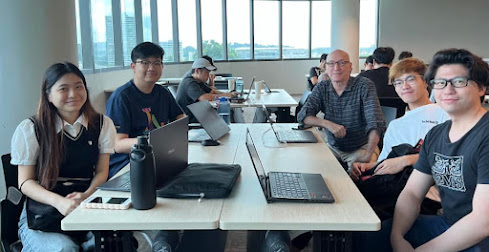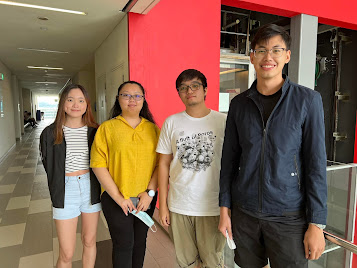These posts are created with the aim of stimulating and facilitating interaction within my online community. (For many years, I used this blog to facilitate discussions amongst my university students.)
Friday, November 25, 2022
And one more group of fine mechanical engineering students for Tri1 2022-23: UCS1001 MEC S15.
Another formidable batch of future engineers: Critical Thinking & Communicating, UCS1001 MEC, S14, Tri1 2022-23
All's Well with the Purifiers
Sure Team (No) Water Troubles
Confident Dora's Explorers
Thursday, November 24, 2022
What a smart, handsome bunch: Robotics Engineering, UCS1001--Critical Thinking & Communicating, Section 27, Tri1 2022-23
The End Effect Gang
Incomparable Swiper
Cool DJCube
Rockin' Libbotarms
The Savvy SARR
Wednesday, November 23, 2022
thoughts from Huxley's The Divine Within: Selected Writing on Enlightenment, 1955
"What are we in relation to our own minds and bodies — or, seeing that there is not a single word, let us use it in a hyphenated form — our own mind-bodies? What are we in relation to this total organism in which we live?
[…]
"The moment we begin thinking about it in any detail, we find ourselves confronted by all kinds of extremely difficult, unanswered, and maybe unanswerable questions.
[…]
"I wish to raise my hand. Well, I raise it. But who raises it? Who is the 'I' who raises my hand? Certainly it is not exclusively the 'I' who is standing here talking, the 'I' who signs the checks and has a history behind him, because I do not have the faintest idea how my hand was raised. All I know is that I expressed a wish for my hand to be raised, whereupon something within myself set to work, pulled the switches of a most elaborate nervous system, and made thirty or forty muscles — some of which contract and some of which relax at the same instant — function in perfect harmony so as to produce this extremely simple gesture. And of course, when we ask ourselves, how does my heart beat? how do we breathe? how do I digest my food? — we do not have the faintest idea.
[…]
"We as personalities — as what we like to think of ourselves as being — are in fact only a very small part of an immense manifestation of activity, physical and mental, of which we are simply not aware. We have some control over this inasmuch as some actions being voluntary we can say, I want this to happen, and somebody else does the work for us. But meanwhile, many actions go on without our having the slightest consciousness of them, and … these vegetative actions can be grossly interfered with by our undesirable thoughts, our fears, our greeds, our angers, and so on…
"The question then arises, How are we related to this? Why is it that we think of ourselves as only this minute part of a totality far larger than we are — a totality which according to many philosophers may actually be coextensive with the total activity of the universe?
[…]
"Obviously, if we have to get out of the way of the traffic on Hollywood Boulevard, it is no good being aware of everything that is going on in the universe; we have to be aware of the approaching bus. And this is what the brain does for us: It narrows the field down so that we can go through life without getting into serious trouble.
"But … we can and ought to open ourselves up and become what in fact we have always been from the beginning, that is to say … much more widely knowing than we normally think we are. We should realize our identity with what James called the cosmic consciousness and what in the East is called the Atman-Brahman. The end of life in all great religious traditions is the realization that the finite manifests the Infinite in its totality. This is, of course, a complete paradox when it is stated in words; nevertheless, it is one of the facts of experience.
[…]
"This is the greatest gift which man has ever received or given himself, the gift of language. But we have to remember that although language is absolutely essential to us, it can also be absolutely fatal because we use it wrongly. If we analyze our processes of living, we find that, I imagine, at least 50 percent of our life is spent in the universe of language. We are like icebergs, floating in a sea of immediate experience but projecting into the air of language. Icebergs are about four-fifths under water and one-fifth above. But, I would say, we are considerably more than that above. "I should say, we are the best part of 50 percent — and, I suspect, some people are about 80 percent above in the world of language. They virtually never have a direct experience; they live entirely in terms of concepts.
"When we see a rose, we immediately say, rose. We do not say, I see a roundish mass of delicately shaded reds and pinks. We immediately pass from the actual experience to the concept.
[…]
"We cannot help living to a very large extent in terms of concepts. We have to do so, because immediate experience is so chaotic and so immensely rich that in mere self-preservation we have to use the machinery of language to sort out what is of utility for us, what in any given context is of importance, and at the same time to try to understand—because it is only in terms of language that we can understand what is happening. We make generalizations and we go into higher and higher degrees of abstraction, which permit us to comprehend what we are up to, which we certainly would not if we did not have language. And in this way language is an immense boon, which we could not possibly do without."
Love Is the Last Word: Aldous Huxley on Knowledge vs. Understanding and the Antidote to Our Existential Helplessness (an adapted excerpt) by Maria Popova
(Aldous) Huxley writes:
"Knowledge is acquired when we succeed in fitting a new experience into the system of concepts based upon our old experiences. Understanding comes when we liberate ourselves from the old and so make possible a direct, unmediated contact with the new, the mystery, moment by moment, of our existence." (The Divine Within: Selected Writing on Enlightenment, 1955)
Because the units of knowledge are concepts, and concepts can be conveyed and transmitted in words and symbols, knowledge itself can be passed between persons. Understanding, on the other hand, is intimate and subjective, not a conceptual container but an aura of immediacy cast upon an experience — which means it cannot be transmitted and transacted like knowledge. Our forebears devised ways of transmitting knowledge from one generation to the next — in words and symbols, in stories and equations — which ensured the survival of our species by preserving and passing down the results of experience. But knowing the results of an experience is not the same as understanding the experience itself. Complicating the matter is the added subtlety that we may understand the words and symbols by which we tell each other about our experience, but still miss the immediacy of the reality those concepts are intended to convey. Huxley writes:
"Understanding is not conceptual, and therefore cannot be passed on. It is an immediate experience, and immediate experience can only be talked about (very inadequately), never shared. Nobody can actually feel another’s pain or grief, another’s love or joy or hunger. And similarly nobody can experience another’s understanding of a given event or situation… We must always remember that knowledge of understanding is not the same thing as the understanding, which is the raw material of that knowledge. It is as different from understanding as the doctor’s prescription for penicillin is different from penicillin.
"Understanding is not inherited, nor can it be laboriously acquired. It is something which, when circumstances are favorable, comes to us, so to say, of its own accord. All of us are knowers, all the time; it is only occasionally and in spite of ourselves that we understand the mystery of given reality."
(from the essay "Knowlege and Understanding," in The Divine Within, 1955)










































